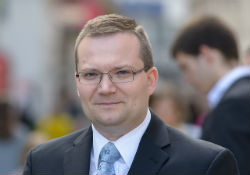Marko, economics graduate from Slovenia

Hepatitis action plan strategic direction 1: information for focused action
My journey from being diagnosed with hepatitis C to now being cured has been a long and complicated one. I was in denial when I was first diagnosed – I asked myself, “How can this be true when I am feeling so ‘normal’?” I put off treatment for 10 years, and it was not until some tests came back showing that liver damage had occurred that I was able to trust my doctor – after some tough reality talks – and begin the life-saving treatment that I needed.
Hepatitis is a silent killer. If you do not have access to the services you need and a supportive environment around you, then it is easy to go on with your life and ignore it until it is too late. It is very hard to start treatment, one that you really need to take time out of your life for, when you feel no symptoms. You need to trust the blood tests and the medical professionals.
The treatment path for me was extremely tough. However, I now see that treatment and care are improving, with fewer and fewer side-effects. The treatment I went through – interferon – and the side effects induced were so complicated and debilitating that I felt the need to write a book about my experience. I really was not prepared for the psychological side effects – I did not get warned about these, but rather more of “we will just manage as we go”. Maybe my doctor did not want to scare me off and just needed me to start the treatment, but it was a very hard time for my family and me. Due to the treatment and side-effects, I was disconnected from my friends and business colleagues for a year and a half.
Because of the stigma surrounding hepatitis, I hid my diagnosis for too long from everyone – my friends, family and colleagues. A defining moment for me was when I truly came to accept my diagnosis and the need to take care of myself in order to recover fully. I was out alone and I collapsed in the street – I was not eating or drinking sufficiently at the beginning of my treatment, as I was still in denial about being sick at all. I thought I was a healthy young man, but I was not. When the ambulance arrived I had to openly tell them the medications I was on and that I was hepatitis C positive.
I needed to go through this treatment and tough times to reach the place I am now. I now live hepatitis C free and have supportive family and friends around me, with no secrets about my diagnosis.
I want to be able to support others and help to enhance the accessibility and equity of services, not only in my country but in the whole European Region. I started the Slovenian national organization for people living with hepatitis C. We are a community committed to creating an enabling environment promoting effective action and delivering equity in care and treatment. It provides a platform for civil society to contribute to the national response on viral hepatitis. Our goal is to build a community for people affected by hepatitis, and I could not be more proud to be a part of it.



